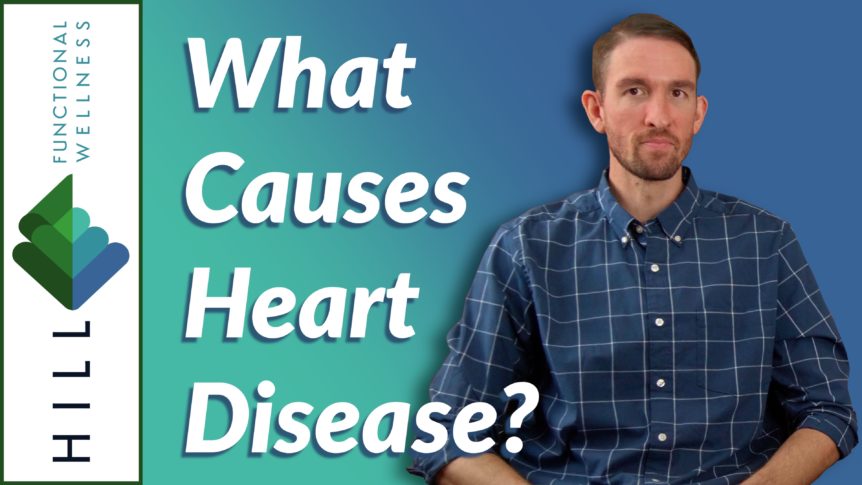The unfortunate consequence of a significant increase in prevalence of adverse health consequences like heart attacks is that as more and more people add to the statistic, we become desensitized to the seriousness of the issue. And on top of that, we can fall into the trap of thinking that it is an inevitable part of aging. Well, the reality is that nothing could be further from the truth. As devastating as heart attacks can be, gaining perspective on what causes them is the best first-step toward re-sensitization (and ultimately, reduction in prevalence!).
At a physiological level, a heart attack happens when coronary arteries (the arteries that supply blood to heart muscle) become blocked, restricting vital blood flow to the heart and causing temporary or permanent damage to the heart muscle. When heart muscle is damaged, it can’t circulate blood to the body, and problems arise very, very quickly. According to a report from the American Heart Association, approximately 14 percent of individuals who have a heart attack will die from it.
Heart disease is largely preventable, yet it remains the biggest threat to the health of individuals in the U.S. It is estimated that by 2035, more than 130 million U.S. adults will have some degree of heart disease. Continued wide-spread health issues like these will reduce life expectancy and continue to mount an insurmountable financial burden for future generations.
In order to better understand the current climate on this issue, two issues need to be put into context. First is the misconception that genetics are the biggest determinant in the development of future adverse health conditions. The second issue: the impact of lifestyle. Today, diets full of highly processed ‘foods’, lack of exercise, smoking, excessive drinking, high stress, and other manageable factors contribute a significant amount of burden on the heart.
Are Genetics the Best Predictor of Heart Attacks?
There is an emerging narrative in the world of health care that we are victims of our genetic make-up. The implications of this narrative are that if we (by chance, mind you) are born with a specific genetic trait, it is an inevitability that we will succumb to the negative health outcomes that result from that trait.
The only problem is that there is ample scientific evidence that points to an alternate narrative: that gene expression depends, at the very least in part, on the environmental factors surrounding the genetic material.
What this means is that your genetics alone are not accurate predictors of negative health outcomes like heart attacks. The lifestyle decisions you make on a daily basis will dictate whether or not the genes in question will be expressed. When we include this understanding into the big-picture, we can put the power and responsibility in the hands of the individual in question. No longer is it acceptable to think of ourselves as victims of our genetic make-up. How we live our lives is a significant variable that cannot be overlooked if we want to address our cardiovascular health.
And the good news – you have complete control of most of these lifestyle decisions.
Lifestyle Choices to Help Avoid Heart Attacks
Heart attacks often arise because of a prolonged pattern of poor lifestyle decisions. However, even if you currently do suffer from heart disease symptoms like high blood pressure, there is hope! Just as we can attribute cardiovascular health decline to poor lifestyle choices, we can also attribute improvement to better lifestyle choices. Here are a few ways to better not only your heart health but your overall well-being:
Drinking Water – A good starting point for water intake is daily consumption equal half an individual’s weight in ounces. Therefore, a 150-pound individual should consume roughly 75 ounces of water a day.
Optimizing Iron – Iron is an important nutrient for a healthy body. If not enough iron is present in a diet, or it is not properly being absorbed by the body, it can result in an insufficient amount of oxygen being delivered to the heart. (note: ALWAYS test iron levels before thinking about addressing iron supplementally)
Eliminating Toxins – Harmful toxic chemicals that are brought into the body via the environment or foods can add to the level of cardiovascular inflammation. Products like weed-killer and bug spray are commonly used household goods that present dangerous chemicals. Remember, many harmful substances are transported through the cardiovascular system on their way to the liver or kidneys to be eliminated.
Stopping Tobacco Use – Tobacco use causes blood vessels to thicken and grow narrow. This increases blood pressure and forces the heart to work harder to circulate blood.
Eating a Proper Diet – Eliminating trans fats, artificial sweeteners, and highly processed foods is a good first step. The Mediterranean diet has shown to be a heart positive diet, and is built primarily around the high consumption of fruits, vegetables, potatoes, beans, nuts, and seeds, with moderate consumption of cold-water fish, poultry, and dairy products on occasion.
Regular Exercise – It is suggested to get at least 30 minutes of daily exercise. This produces positive stress on the heart, promoting resilience, reducing inflammation, and boosting HDL levels.
Getting Good Sleep – Under or oversleeping has proven to negatively impact the heart. We encourage 8 quality hours of sleep every night.
Reducing Daily Stressors – Carrying large amounts of daily stress can cause inflammation on the heart. Finding ways to reduce and cope with stress can help improve heart health. Supplements like omega 3 and valerian root have shown to help reduce stress biomarkers, as well as, yoga, massage therapy, deep-breathing, social support networks, physical touch from loved ones, having a positive self-image, and engaging in hobbies.
The Power of the Body to Heal
Here at Hill Functional Wellness, our philosophy revolves around empowerment and putting you in charge of your own health. By helping you identify the root cause of your heart disease concerns, we can guide you toward improvement of your health status. The body is designed to take care of itself and even heal from injury and disease when given the right conditions. This often requires intervention specific to what each individual is struggling from. That’s where we come in.
Through personalized testing and a patient-specific treatment plan, we will work closely with you to implement changes that can help better your heart health and reduce the risk of serious events like heart attacks.
Managing Your Heart Health in Tempe, Arizona
If you are concerned you may be at risk for heart disease or have already been diagnosed with heart disease, we are here to help. Contact us today to schedule an appointment at our Tempe, Arizona office, and we will develop an action plan that addresses your body’s specific needs.

